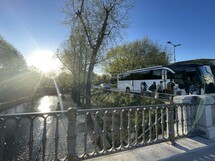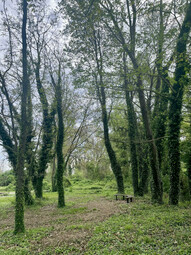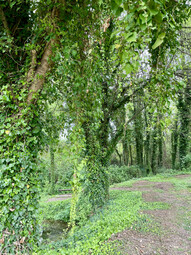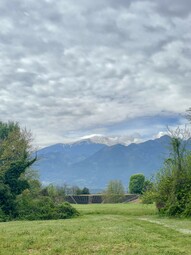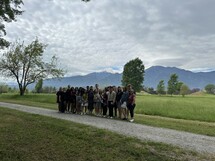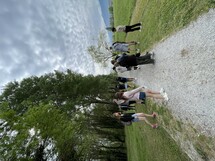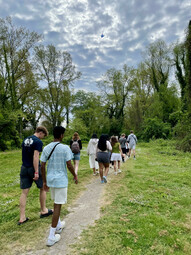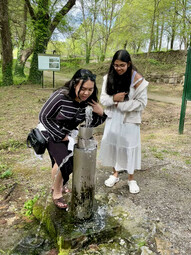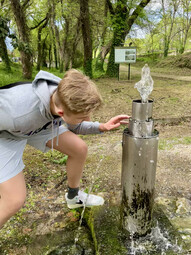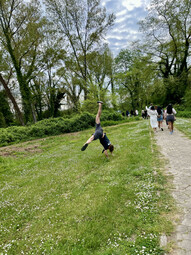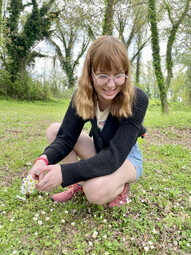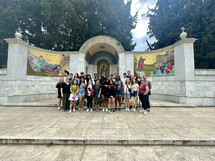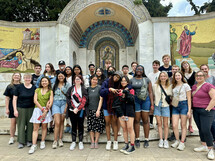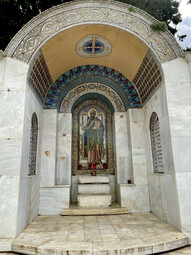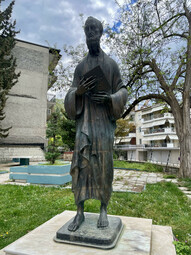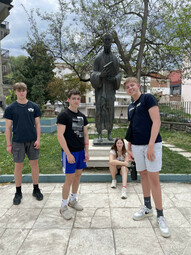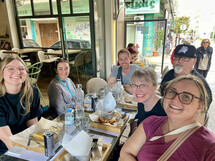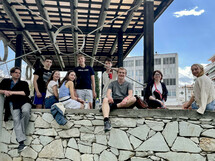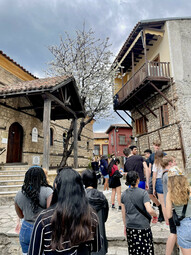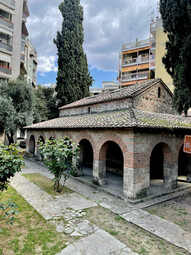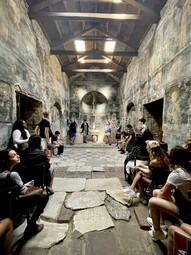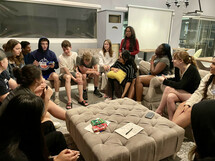Day 7: Dion, Veria, and Thessaloniki
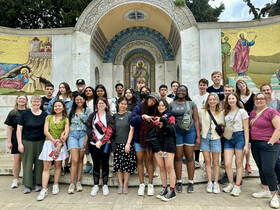
We start the day with a drive to Dion and Elie provides us with more historical context to help us understand why the gospels were written in Greek. Alexander the Great convinces thousands of soldiers to follow him as he conquers and spreads Greek culture across the known world (Africa, Europe and Asia) going as far as India. This is the Hellenistic Period and it lasts two centuries, from 323 BC to 31 BC, ending with the conquest of Greece by the Roman Empire. Jesus was born into a culture with many Hellenistic influences which explains why the gospels were written in Greek and not Aramaic.
After Alexander’s death at only 33 years old, the Middle East and North Africa were ruled by Greek dynasties. In Egypt, for example, the Ptolemys replace the Pharaohs. Cleopatra was the queen of the Ptolemaic Kingdom of Egypt from 51 to 30 BC and was a descendant of a Macedonian Greek general and companion of Alexander the Great. Cleopatra is a Greek name, cleo meaning pride and patra meaning father: the pride of her father. Elie teaches us that Macedonians were Greeks from the North and we know this because Macedonians spoke Greek and practiced the same religion, giving us more context for understanding the references to Macedonia in the bible. We also learn that it is the Ptolomy dynasty that is responsible for creating the most important cultural center of the ancient Mediterranean world, which included exploration of mathematics, astronomy, art, language, and culture. It is here that the Old Testament is translated into Greek. Christianity is really born within a mixture of Greek, Roman, and Jewish culture, so it is important to understand how this unfolded.
We arrive at our first stop of the day, the archeological site of Dion. This site is at the base of the Mount Olympus mountain range which is where the ancients believed the gods resided. Dion comes from the Greek word for Zeus and is the sacred place of Zeus frequently visited by Macedonian kings who came to sacrifice to and worship Zeus Olympios and the Muses. There are also temples dedicated to Demeter, the goddess of fertility, a stadium, a small theater (called an odeum), and the bath houses. While there is no historical record of this, it is probable that Paul would have taken a vessel from Dion to Athens as it is the nearest port to Veria.
We are surrounded by vibrant greenery and wildlife as this area was a swamp before it was drained to preserve the archeological finds. As Keagan puts it, “there is so much life here”. The trees themselves are decorated with leaves and vines that twist around their trunks, we hear the sounds of croaking of frogs and geckos, and sight a turtle and a snake. The groves of trees look like scenes from Lord of the Rings. In the same place where temples are built to worship other gods, our students spread out and spend some time in devotions, meeting with the one true God.
On our way out Imonitie and Arie take turns doing cartwheels. Mrs. Kooiker then performs a flawless two-handed cartwheel and Mr. Hartley stuns with a one-handed cartwheel! Ava also finishes the flower crown of daisies she has been picking.
Our next stop is Veria, called Berea in the bible. This is the location of the bema (the step or platform), where Paul would have preached the gospel from. Today, there stands a monument to St. Paul at this spot. Paul stayed for some time in Veria, as the people were receptive to hearing the gospel. In Acts 17 we read, “As soon as it was night, the believers sent Paul and Silas away to Berea. On arriving there, they went to the Jewish synagogue. Now the Berean Jews were of more noble character than those in Thessalonica, for they received the message with great eagerness and examined the Scriptures every day to see if what Paul said was true. As a result, many of them believed, as did also a number of prominent Greek women and many Greek men.”
We also walk through the winding, cobblestone streets into the Jewish quarter of the city. Before WWII, there were 47,000 Jews living in Thessaloniki. Only 1000 remain, many being murdered in concentration camps and remaining survivors unable or deciding not to return. Veria is a smaller city and only 650 Jews lived there before WWII. The vast majority of the Verian Jews were killed in the Holocaust. We come to one of the oldest synagogues in Greece, built in 1850 potentially at the same location as a more historic synagogue of the past and see an almond tree growing up and blossoming beside it. Mr. Hartley explains the symbolism of the almond tree referencing how God identified Moses as the leader of all the Israelites when it was Moses’ staff alone that blossomed with almonds. This tree references the Torah and also stands as a symbol of the resilience of the Jewish people. This is likely the location of the synagogue Paul visited. Imagine Paul in the synagogue pouring over the Torah with the Jews to show them how every story points to Jesus.
We eat lunch before discovering one of the oldest churches here in Veria. The building walls and roof have been maintained, but many of the frescoes are fading and chipped. We sit inside the church together as Pastor Grover reads a scripture with time to reflect and process.
Next we make our final drive to the city of Thessaloniki. We drive along the waterfront that is spotted with ships and boats and notice the active life of the city. There are people sitting at cafes and shops, sipping coffee and visiting with each other, while others walk the boardwalk along the waterfront. We arrive at our hotel, have supper there, and play catchphrase as a large group. This is a game where you have to explain a term and have your team guess the word or phrase. Imonitie likes to use actions and sound effects for context, Luke says, “Ahhhh” and raises his hands in an animated shrug if the timer goes off in his hands, and Marlena can’t help but say, “What the frick?” when a term seems too hard to describe under the pressure of an increasingly fast-paced countdown. I was personally impressed with how quickly they were able to have their team guess the social studies related words! There is something special about spending time in a large group all together and it is a great way to end the evening.
We have one day left (apart from our travel day) and we feel the end of our journey looming but we don’t want it to be over. Joel is so integrated into Greek culture that he is calling the hotel “home”, students are just getting the hang of saying “good morning” and “thank you” in Greek, and we are going to miss Elie greatly. This is motivation to be present and engaged in every moment tomorrow.
Comments
Francis
PostedThank you for taking the time to make this blog possible. Great read and pictures! We pray that this experience has made an impact in the spiritual walk of each student. May God bless and keep you all safe on the way back.
Pauline Deglint
PostedThankyou Mrs. Cathcart for the amazing and informative posts and pictures!! We have loved following your trip, and learning along with you folks. Wishing you all a wonderful last day of exploring and a very safe trip home. We look forward to your return ❤️.

